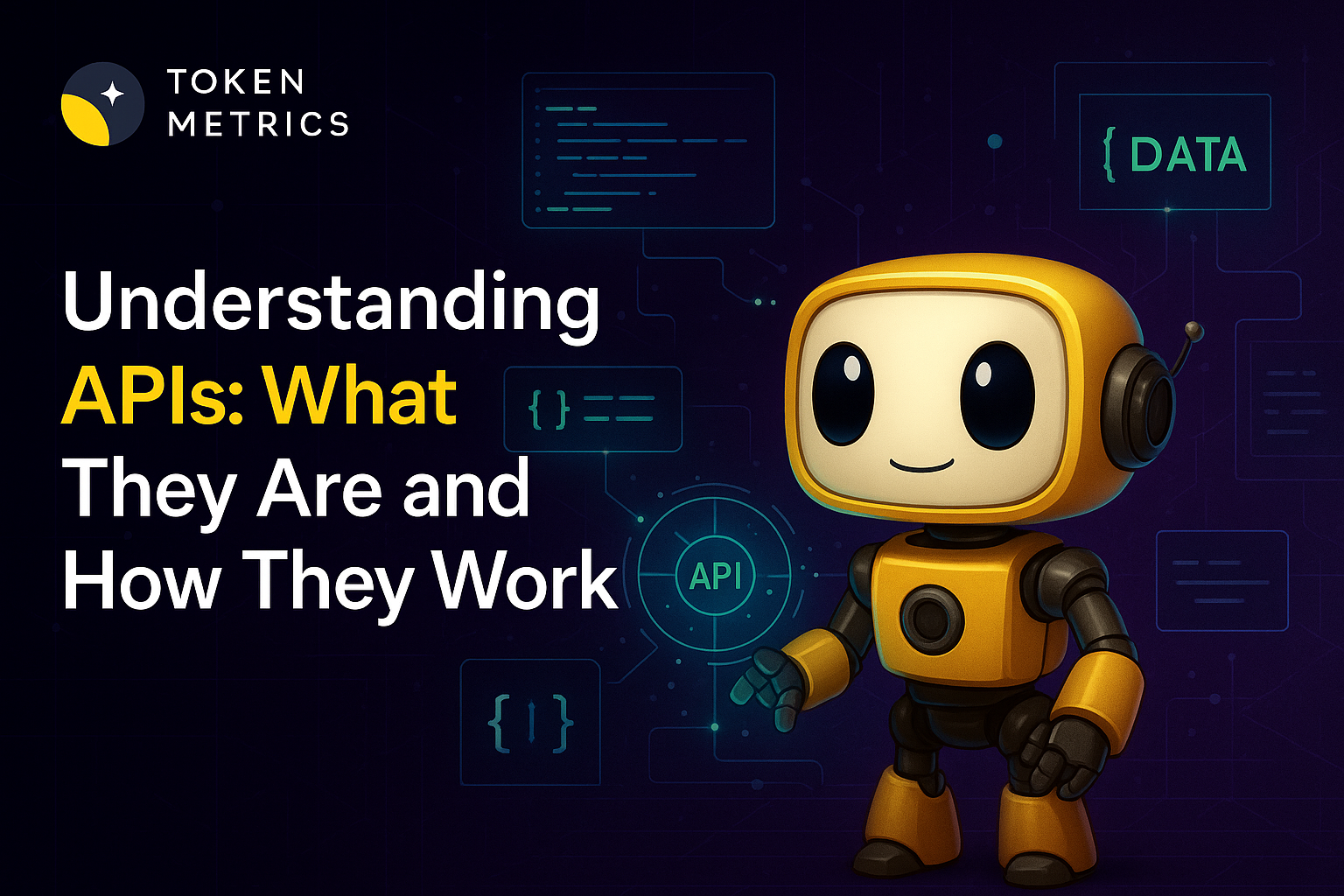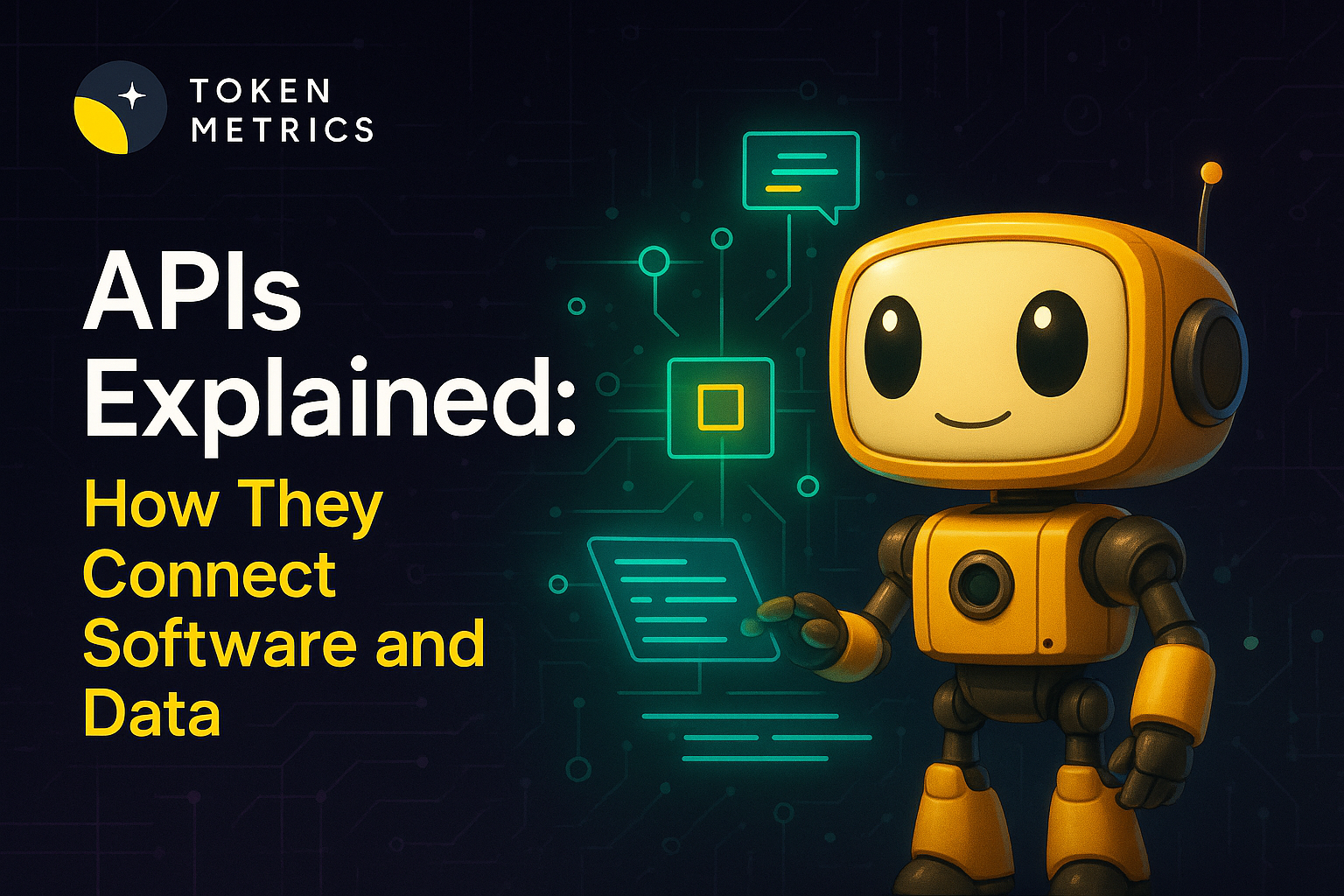
Top Tools and APIs Every Crypto Programmer Should Know

The rapid evolution of cryptocurrencies and blockchain technology has transformed the programmer's toolkit. With thousands of coins, myriad chains, and constantly changing data, developers face a unique set of challenges—and opportunities—for innovation. Access to robust APIs, powerful software tools, and automation frameworks is now the backbone of successful crypto development. But which tools and APIs stand out, and how can programmers leverage them most effectively?
Data Access: Core APIs That Power Crypto Apps
APIs are the connective tissue of crypto ecosystems, granting developers access to everything from real-time prices to on-chain analytics. Leading APIs for general-purpose crypto data include:
- Token Metrics API: Delivers real-time prices, trading signals, token analytics, and on-chain intelligence in a streamlined package—ideal for portfolio tools, custom dashboards, and AI crypto agents.
- CoinGecko API & CoinMarketCap API: Widely adopted for fetching coin prices, historical data, and basic market stats. Both offer generous free tiers and support for hundreds of assets.
- CryptoCompare API: Excels at aggregated pricing and historical OHLCV data for major and emerging tokens.
- Glassnode API: Provides on-chain analytics, key network health indicators, and user address statistics for Bitcoin, Ethereum, and select other blockchains.
When evaluating APIs, focus on latency, coverage, reliability, and pricing. For power users, combining multiple APIs—one for fast price ticks, another for analytics—can yield a richer app experience.
Web3 Libraries and Blockchain Interaction
To move beyond price feeds and statistics, programmers need libraries that let them interact directly with blockchains. Popular choices include:
- web3.js (for Ethereum and EVM chains): The standard JavaScript library for reading from and writing to smart contracts. Its widespread adoption means strong documentation and fast troubleshooting.
- ethers.js: A leaner, modern alternative to web3.js with an improved developer experience and clear separation of concerns. Frequently used in dApp and wallet development.
- Solana Web3.js: Purpose-built for the Solana chain, providing access to wallet management, transaction sending, and program deployment.
- BitcoinJS: A robust set of bitcoin-focused tools for crafting transactions, managing keys, and building lighter clients.
When building cross-chain or multi-protocol applications, consider abstraction libraries like Moralis or Infura to standardize access and boost reliability.
Automation, Research, and AI Analytics
Quantitative research, automated trading, and actionable intelligence are increasingly important areas for crypto programmers. Here are some tools advancing the field:
- Python Libraries (ccxt, pycoingecko, web3.py): The ccxt library supports unified trading API access to dozens of exchanges for algorithmic trading and market research. pycoingecko fetches comprehensive price data from CoinGecko, while web3.py allows direct Ethereum interaction.
- Alchemy & QuickNode: Managed web3 infrastructure layers that offer turnkey node hosting, enhanced analytics, and performance monitoring. These services reduce operational headaches when scaling production apps.
- AI-Powered Research Tools (Token Metrics, Messari): Platforms like Token Metrics and Messari leverage AI and big data to surface trends, risk signals, and deep network insights—resources invaluable for building smarter automation and predictive analytics.
For custom analytics, combining API data with Python-based data science (using Pandas, Numpy, or PyTorch/TensorFlow) unleashes powerful modeling capabilities. Many teams run scheduled scripts or Lambda jobs that pull API data, process it, and feed insights directly into dashboards or real-time agents.
Open Source and Collaborative Developer Tools
Open source projects have accelerated innovation in crypto. For developers, the following tools and resources unlock new possibilities:
- Hardhat & Truffle: Smart contract testing, simulation, and deployment for EVM-compatible chains. Supports complex scripting and plugin extensions.
- MetaMask APIs: Essential for dApp compatibility, wallet integration, and user authentication across the web3 landscape.
- Foundry: A high-performance, developer-friendly toolkit for smart contract creation with extensive testing capabilities.
- OpenZeppelin Libraries: Battle-tested, audited Solidity contracts and utilities for security-focused development. Saves time and reduces risk.
Participating in open source helps programmers stay at the forefront of security updates, tooling improvements, and emerging best practices.
Build Smarter Crypto Apps & AI Agents with Token Metrics
Token Metrics provides real-time prices, trading signals, and on-chain insights all from one powerful API. Grab a Free API Key
What are the most popular APIs for crypto data access?
Some of the most widely used APIs include the Token Metrics API, CoinGecko API, and CryptoCompare API for price data, plus Glassnode and Chainalysis for on-chain analytics. The best API depends on use case—real-time trading apps may prioritize low-latency data, while research dashboards need deeper analytics and coverage.
How do you choose the right programming language for crypto development?
The choice depends on your project: Solidity is used for Ethereum smart contracts, Rust and C++ for Solana and Polkadot, JavaScript for web3 frontends, and Python for automation and analytics. Many developers combine languages for optimal results.
Can I integrate crypto APIs into mobile apps?
Yes. Most crypto APIs offer REST or WebSocket endpoints that can be consumed by mobile frontends (iOS, Android, cross-platform). Security and performance are critical—always safeguard keys and minimize on-device sensitive data.
What is the value of AI in developer crypto tools?
AI supports smarter data synthesis, risk assessment, pattern recognition, and predictive analytics—streamlining everything from backtesting to sentiment analysis. Platforms such as Token Metrics bring AI-driven signals and deep analysis to developer workflows.
Are open source crypto developer tools secure?
Open source tools like Hardhat, Truffle, and OpenZeppelin are generally well-maintained and audited but still require careful review, secure library management, and rigorous testing. Always vet dependencies and stay up to date with patches.
Disclaimer
This blog is for informational and educational purposes only. It does not constitute investment advice, endorsement, or financial recommendations. All tools and APIs discussed should be independently evaluated for your use case and risk profile.

.svg)

Create Your Free Token Metrics Account

.png)




%201.svg)
%201.svg)


%201.svg)









.svg)




.png)